|
|
|
Sort Order |
|
|
|
Items / Page
|
|
|
|
|
|
|
| Srl | Item |
| 1 |
ID:
112807
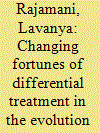

|
|
|
|
|
| Publication |
2012.
|
| Summary/Abstract |
This article traces the evolution of international environmental law and dialogue in the four decades from Stockholm, 1972, to Rio+20, 2012, with a focus on the changing dynamics of the discourse between developed and developing countries, and the corresponding interpretational shifts in the application of differential treatment in international environmental law-climate change law in particular. This article argues that in the first three decades of environmental diplomacy, from 1972 to 2002, the international community witnessed an exponential growth in the number and range of multilateral environmental agreements, an array of tools, techniques and practices, and a rapid expansion of differential treatment in favour of developing countries. Differential treatment in central obligations, albeit disputed from its inception, found pride of place in the Kyoto Protocol negotiated in 1997. The decade that followed, 2002 to 2012, witnessed heightened popular and political mobilization around the climate change issue. But, in response to seemingly intractable difficulties across the North-South and North-North spectrum, it was accompanied by a retreat from differential treatment in central obligations. The battle over the future (or lack thereof) of the Kyoto Protocol, and the recent developments in the climate regime-in particular the 2011 Durban Platform Decision-testify to this retreat from certain variants of differential treatment, and interpretations of equity and common but differentiated responsibilities. An analysis of these developments and the politics that gave rise to them, reveal that while the international regime can survive the erosion of certain limited forms of differential treatment, a wholesale rejection of differential treatment, and of the 'equity' concerns that animate it, would destabilize the normative core of the regime as well as render the climate regime unattractive to key players like India.
|
|
|
|
|
|
|
|
|
|
|
|
|
|
|
|
| 2 |
ID:
112806


|
|
|
|
|
| Publication |
2012.
|
| Summary/Abstract |
Standard works on international environmental governance assume single-issue regimes with binding obligations designed to govern the behaviour of states. Yet many of the most pressing global environmental problems, including climate change, forest degradation and biodiversity loss, are governed by an array of mechanisms-legal, non-legal, governmental and non-governmental-in complex arrangements. Examining the combined effects of these international and transnational efforts on domestic or firm policies and practices-the usual targets of such efforts-requires expanding a focus on regime 'compliance' and 'effectiveness' to 'influence' factors from beyond state borders. To facilitate such a move, the authors develop a framework that distinguishes four distinct pathways through which actors and institutions influence domestic policies: international rules; international norms and discourse; creation of, or interventions in, markets; and direct access to domestic policy processes. Propositions are then developed on the conditions under which, and processes through which, actors and institutions affect domestic and firm policies and practices along each pathway. The framework is applied to the case of forest governance, a prototypical example of complex global environmental governance.
|
|
|
|
|
|
|
|
|
|
|
|
|
|
|
|
| 3 |
ID:
112800


|
|
|
|
|
| Publication |
2012.
|
| Summary/Abstract |
There is a widespread perception that power is shifting in global politics and that emerging powers are assuming a more prominent, active and important role. This article examines the role of emerging powers such as China, India, Brazil and South Africa (BASIC) in climate change politics and the extent to which their rise makes the already difficult problem of climate change still more intractable-due to their rapid economic development, growing power-political ambitions, rising greenhouse gas emissions and apparent unwillingness to accept global environmental 'responsibility'. By reviewing the developments in global climate politics between the 1992 Rio Earth Summit and Rio+20, this article unsettles the image of a clear shift in power, stressing instead the complexity of the changes that have taken place at the level of international bargaining as well as at the domestic and transnational levels. Within this picture, it is important not to overestimate the shifts in power that have taken place, or to underplay the continued relevance of understanding climate change within the North-South frame. Emerging powers will certainly remain at the top table of climate change negotiations, but their capacity actively to shape the agenda has been limited and has, in some respects, declined. Even though emerging powers have initiated and offered greater action on climate change, both internationally and domestically, they have been unable to compel the industrialized world to take more serious action on this issue, or to stop them from unpicking several of the key elements and understandings of the original Rio deal. At the same time, developing world coalitions on climate change have also fragmented, raising questions about the continued potency of the 'global South' in future climate politics.
|
|
|
|
|
|
|
|
|
|
|
|
|
|
|
|
| 4 |
ID:
112804
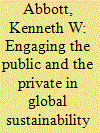

|
|
|
|
|
| Publication |
2012.
|
| Summary/Abstract |
Negotiators preparing for Rio+20 are missing an important opportunity. Private sustainability governance (PSG) is thriving: organizations created by business and civil society groups, as well as public-private partnerships, adopt and apply significant regulatory standards and undertake valuable operational activities, including pilot projects and financing. However, even though reforming the institutional framework for sustainable development is a central part of the Rio+20 agenda, negotiators are focusing almost exclusively on inter-governmental organizations such as the UN Environment Program (UNEP), the Commission for Sustainable Development and the Economic and Social Council. This public-private engagement gap isolates international governance from the energy and innovation of PSG, and impedes efforts to coordinate the bifurcated and decentralized system of sustainability governance. This article argues that states, and especially international organizations, should actively support PSG as part of the institutional framework for sustainable development, while steering private and public-private schemes towards good organizational practices and the pursuit of public goals. Engagement with PSG would help international institutions pursue their sustainability missions more effectively, promote the emergence of effective and legitimate private schemes, manage fragmentation, promote experimentation and learning, and enhance citizen participation. The article outlines two fruitful modes of engagement pioneered by UNEP: regulatory cooperation, in which international authorities engage directly with business firms, industry groups and other 'targets', influencing them to adopt more sustainable behaviors; and orchestration, in which authorities engage with intermediary organizations, such as multi-stakeholder private governance schemes, catalyzing, supporting and steering them as they seek to influence the ultimate targets of policy.
|
|
|
|
|
|
|
|
|
|
|
|
|
|
|
|
| 5 |
ID:
112802
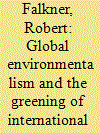

|
|
|
|
|
| Publication |
2012.
|
| Summary/Abstract |
Have environmental values become part of the normative structure of international society? Has the rise of global environmentalism led to a greening of international society? Most International Relations research on environmental issues fails to address these questions as it typically focuses on the creation of issue-specific regimes or informal governance mechanisms. This article engages English School theory in an effort to examine the impact that global environmentalism has had on the social structure of International Relations. It argues that a primary institution of global environmental responsibility is emerging, and explores the relationship and tensions between environmental responsibility and the established primary institutions of sovereignty, international law and the market.
|
|
|
|
|
|
|
|
|
|
|
|
|
|
|
|
| 6 |
ID:
112805
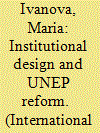

|
|
|
|
|
| Publication |
2012.
|
| Summary/Abstract |
The global environmental governance architecture is set to undergo major reforms, with the main decisions on reform to be taken at the June 2012 Rio+20 UN Conference on Sustainable Development. Discussions on reform have focused on whether the United Nations Environment Programme (UNEP) should retain its institutional status as a subsidiary body of the UN General Assembly, or be transformed into a specialized agency-a World Environment Organization-of the UN. The choice of institutional form, however, cannot be made without reference to both the needs of global environmental governance, and the factors impeding the effectiveness of the current governance architecture. This article takes a historical perspective, highlighting the similarity between the current debate on institutional form, function and financing; and the choices that the original designers of the governance architecture made 40 years ago. The fundamental global environmental problems and the functions of effective global environmental governance, though evolving, have remained largely unchanged. The historical reasons for creating UNEP as it is currently formed thus remain valid today, and provide useful analytical input to the current debate. This article further argues that the reasons for UNEP's shortcomings have little inherent connection to its institutional form, and cannot be resolved simply by a change in status. Deeper, yet probably easier to accomplish, reforms should focus on enabling UNEP to fulfill its intended role as an effective anchor institution for the global environmental governance architecture.
|
|
|
|
|
|
|
|
|
|
|
|
|
|
|
|
| 7 |
ID:
112803
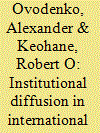

|
|
|
|
|
| Publication |
2012.
|
| Summary/Abstract |
This article explores institutional diffusion in international environmental governance, specifying the conditions under which an existing set of institutions provides a template for new institutions. Prior institutional experiences can help to resolve bargaining problems, reduce transaction costs and provide information about likely performance. The authors discuss five examples of institutional diffusion in international environmental affairs and outline some causal mechanisms and conditions that facilitate or block the diffusion of institutional characteristics. As a baseline analysis, founded on assumptions that abstract from politics, a functional argument is developed about the conditions under which mimetic diffusion, reflecting a pattern of imitation, can occur. Although the focus in this short article is on this functional argument, the authors recognize that state interests and power, ideology, and private interests also play significant roles in facilitating or inhibiting institutional diffusion in international environmental affairs.
|
|
|
|
|
|
|
|
|
|
|
|
|
|
|
|
| 8 |
ID:
112801
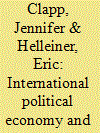

|
|
|
|
|
| Publication |
2012.
|
| Summary/Abstract |
For the past two decades, scholars of international political economy and the environment (IPEE) have become quite focused on the study of various international cooperative initiatives that seek to link economic and environmental issues in the wake of the 1987 Brundtland Report and the 1992 Rio Earth Summit. This important work has enhanced our understanding of topics such as the economic dimensions of international environmental governance, the environmental activities of international economic institutions and regimes, and new kinds of private international regimes governing the environment-economy interface. This focus of IPEE scholarship has, however, steered attention away from larger structural trends in the international political economy, whose environmental implications are not addressed explicitly by significant international governance arrangements. Three such trends that are deserving of more attention from IPEE scholars include: the globalization of financial markets; the rise of newly powerful states such as China and India in the global economy; and the recent emergence of high and volatile commodity prices. Each of these structural trends-as well as their interrelationships-have important environmental consequences whose closer study enhances our understanding of the relationship between the international political economy and the environment. Their study also encourages scholars to widen their focus beyond treaties, institutions and regimes to examine broader global economic structures and processes, and the power relationships within them, in an interdisciplinary manner that can draw inspiration from the pioneers of the field of international political economy from the 1970s.
|
|
|
|
|
|
|
|
|
|
|
|
|
|
|
|
|
|
|
|
|